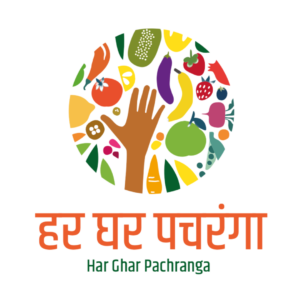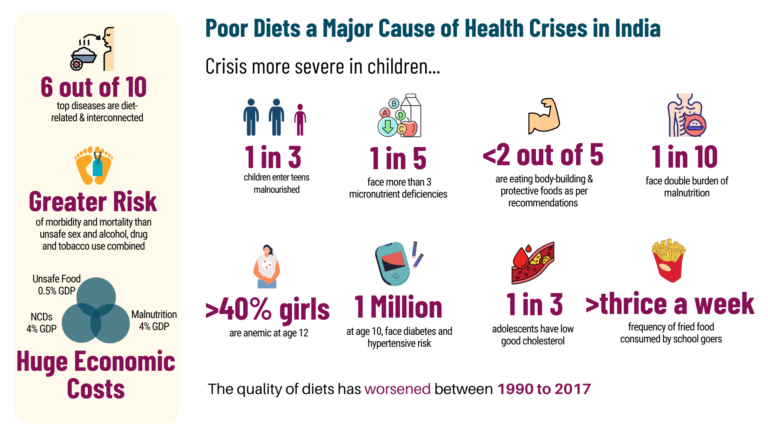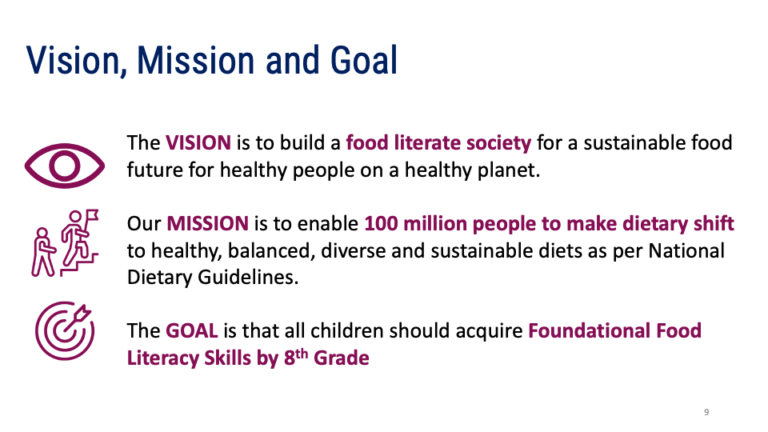Food Literacy
Alliance
Programme for Foundational
Food Literacy in Schools
To Build a Positive Relationship with Food –
a Key to Preventive Healthcare

Let's Celebrate Food & Colours!
Join us on a campaign that touches the most important aspect of human life – food!

India's Health Crisis
India is in the middle of an epidemic of rising obesity, diabetes, undernutrition, and other diet-related diseases.

- Growing childhood obesity, juvenile diabetes, and chronic diseases early in life than before.
- Rising eating disorders at a young age result in low self-esteem, depression, and anxiety.
- Poor immunity resulting in frequent illnesses and infections.
- India has nearly 95,600 cases of Type 1 diabetes among children below 14 years of age and every year 15,990 fresh cases are reported in this age group
THESE TRENDS CUT ACROSS ALL SECTIONS OF SOCIETY
Food and food habits have a bidirectional relationship with physical fitness, sleep, and stress.
What can be done?
Dietary shifts are a key leverage point to address the multiple converging health and environmental crises that we are experiencing today.
There is a need for people to work on making better choices of food, therefore –
Food Literacy: Because Food Choice Matters
Food literacy is the ability to understand, evaluate, engage, and eat foods that meet individual nutritional and health objectives. It must align with one’s culinary tradition and personal preference. It must also aim to achieve the goal of environmental sustainability.
Two interventions are required to raise the food literacy levels:
The first is through programme on foundational food literacy in schools. And the second is to promote food literacy amongst people at large through outreach and engagement.

Why Foundational Food Literacy?
Form basis of all food-related future learning
Foundational food literacy would form the basis of all food-related future learning so that the children live healthy and productive lives and transform their food systems and communities. It is the basic developmental goal to maintain good nutrition, health, and well-being. It would enable children to become motivated, independent, and engaged with food and the food environment and develop respect for food and enable them able to make the right food choices.
Critical to address diet-related health risk factors
Foundational food literacy would be critical to arrest the rising trends of various types of non-communicable diseases and malnutrition of different forms including rising obesity and food-borne illnesses. Given that six out of ten diseases are diet-related, foundational food literacy will arrest and reverse this trend. This would ensure better life outcomes and directly correlates to increased workforce participation and opens up opportunities for social and economic advancement.
Reduce the environmental impact on the food system
Foundational food literacy has focus on eating local, seasonal food and have diverse diet as well as on reducing food waste. Further, while making food choices, its environmental impact is specifically factored in. This focus will enable shift to sustainable diets and reducing food waste. This would help alleviating the adverse impact of food system on environment and climate change.
Ensure equitable & inclusive opportunity
Disadvantaged and low-income families do not have access to education and information on diet and nutrition, given that active engagement of parents and families is essential here, foundational food literacy not only benefits the child but the entire family and lays the foundation for preventive health and wellbeing for the entire society.